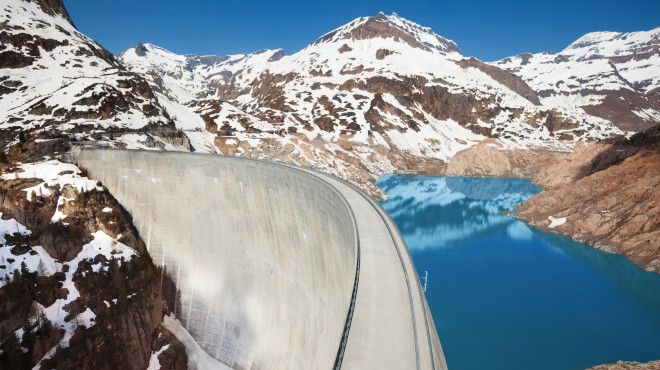
New study shows: Nuclear power would make the energy transition safer and cheaper - even in the future
For a reliable, climate-neutral and economical electricity supply, we need "a lot of everything", especially in winter - both renewables and nuclear power can play an important role. On behalf of economiesuisse, the Energy Science Center at ETH Zurich has calculated corresponding scenarios. Longer NPP lifetimes reduce the costs of the energy system by about 11 billion Swiss francs and close the winter electricity gap. In a scenario with an additional new nuclear power plants (NPP) after 2040, security of supply would be further strengthened.
The bill on a secure electricity supply from renewable energy sources (so-called umbrella law) is on its final leg in parliament. With this federal act, renewable energies are to be massively expanded by 2050. But are the goals of this new reference scenario achievable and will we have enough winter electricity? And can we do without nuclear power plants altogether in the future? The Energy Science Center at ETH Zurich was commissioned by economiesuisse to investigate these questions. The results of the study now available show: The federal act is necessary, but not sufficient to achieve the ambitious goals (35 TWh of renewables are to be added by 2035, 45 TWh by 2050). In the reference scenario, net imports in winter also grow to up to ten terawatt hours - this corresponds to about three times the annual electricity consumption of the city of Zurich. Alternative scenarios with longer operating times of the existing NPPs are significantly cheaper and safer. An additional, new NPP from 2040 onwards would further strengthen security of supply and would also have economic prospects, although there are uncertainties regarding investment and financing costs. At the same time, NPP electricity practically does not compete with the expansion of solar power on roofs - renewables and nuclear power are not an "either or", but a "both and".
Longer lifetimes for nuclear power plants significantly reduce system costs and increase security of supply
As of today, the Swiss NPPs Beznau 1 and 2 are expected to remain in operation for 60 years, Gösgen and Leibstadt for 50 years each. This would mean that the last NPP in Switzerland would be taken off the grid in 2034. This study analyses the effects of extending the operating lives of nuclear power plants to 65 and 80 years respectively. The results speak for themselves: Longer lifetimes make the electricity system around 11 billion Swiss francs cheaper by 2050. This would pay for the subsidy measures of the Climate Protection Act recently adopted by the Swiss electorate three times over. The aforementioned winter electricity shortfall could be closed by 2050. The NPPs are in symbiosis with photovoltaics and provide reliable electricity, especially in the cold season.
The world does not end in 2050: New NPPs secure supply in the long term
A scenario with a new NPP from 2040 onwards also performs well in comparison to the reference scenario designed by the "umbrella law" (system cost reduction of around 12 billion Swiss francs and closing of the winter electricity gap - without taking into account the investment costs of a new NPP). Uncertainties exist with regard to investment and financing costs, which is why both savings and additional costs are possible in the final economic analysis up to 2050. However, since the observation period of the model ends in 2050, the effects of the expansion are not fully represented. Substantial additional benefits in the areas of security of supply with climate-neutral electricity until around 2100 are very likely.
Nuclear energy or massive increases in alpine solar and wind power - we need at least one option
Further comparisons of scenarios and sensitivities also make it clear that large-scale renewable plants can also help to ensure security of supply in winter: Photovoltaics on roofs are massively expanded in every scenario, but alone they do not provide security of supply. This requires either energy from extended or new nuclear power plants or an equivalent expansion of wind and alpine solar plants (open spaces). The results clearly indicate that a multiple of the capacities envisaged in the "Solar Express" and the "Wind Acceleration Bill" would be necessary. It is not possible to do entirely without either NPPs or other large-scale renewable plants.
Sensitivities show: electricity trading indispensable in every scenario
The study also reveals interesting facts about the relationship between Switzerland and Europe: from 2025, the EU plans to reserve 70 percent of grid capacities for electricity trading in the Single Market. This could restrict trade with Switzerland, which the study depicts in a sensitivity analysis. It shows: without an exchange with Europe, the electricity system will be around 50 billion Swiss francs more expensive overall by 2050. Even greater efforts will be needed to cover winter demand with domestic production.










